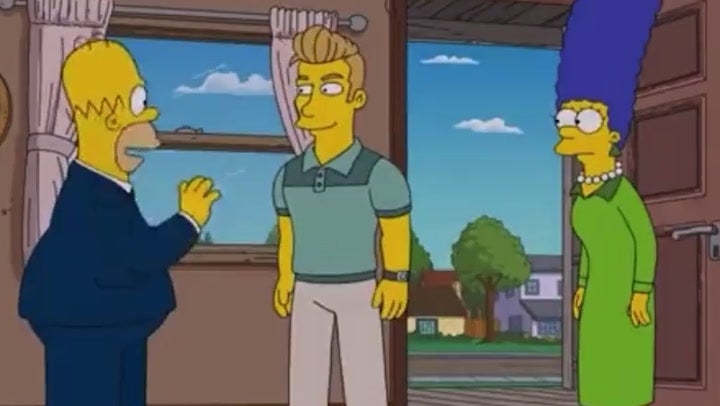New episodes of The Simpsons will no longer make one of the show’s most famous jokes
Simpson patriarch simply acknowledged that ‘times have changed’ in recent episode
Your support helps us to tell the story
From reproductive rights to climate change to Big Tech, The Independent is on the ground when the story is developing. Whether it's investigating the financials of Elon Musk's pro-Trump PAC or producing our latest documentary, 'The A Word', which shines a light on the American women fighting for reproductive rights, we know how important it is to parse out the facts from the messaging.
At such a critical moment in US history, we need reporters on the ground. Your donation allows us to keep sending journalists to speak to both sides of the story.
The Independent is trusted by Americans across the entire political spectrum. And unlike many other quality news outlets, we choose not to lock Americans out of our reporting and analysis with paywalls. We believe quality journalism should be available to everyone, paid for by those who can afford it.
Your support makes all the difference.After 34 years on air and more than 750 episodes produced, The Simpsons could be expected to be stuck in its ways.
Yet, a new edition of the much-loved cartoon has shown its willingness to keep moving with the culture that surrounds it, as patriarch Homer Simpson has revealed he no longer strangles his son, Bart.
A running joke in the animated series has involved Homer reprimanding his mischievous eldest child by squeezing his neck tightly, to the extent that Bart’s eyes bulge and his tongue sticks out.
Despite being one of the most recognisable features of Homer and Bart’s father-son dynamic, the action has been frequently criticised for its brutality.
But in the third episode of season 35, titled “McMansion & Wife”, Homer declares that he’s changed his ways when he and his wife Marge pay a visit to their new neighbour, Thayer.
When Homer introduces himself with a handshake, the new character remarks how firm Homer’s grip is. “See, Marge, strangling the boy paid off,” Homer remarks, before adding: “Just kidding, I don’t do that anymore. Times have changed.”
The episode first aired late last month (22 October), but the remark from Homer generated online conversation when the scene was posted by a viewer on X, formerly Twitter, on Thursday (2 November).

“Took them long enough lmao,” the user, BabyLamb5, added as a caption.
In response, other fans of the show commended Homer acknowledging his disturbing actions towards Bart. One comment reads: “I knew my man Homer was gonna learn.”
The last time Homer was depicted strangling Bart was in season 31 (2019-2020). However, the topic of parent-child violence had been covered on several occasions before that.

Watch Apple TV+ free for 7 days
New subscribers only. £8.99/mo. after free trial. Plan auto-renews until cancelled

Watch Apple TV+ free for 7 days
New subscribers only. £8.99/mo. after free trial. Plan auto-renews until cancelled
In the season 22 episode “Love is a Many Strangled Thing”, Homer attends a “fathering enrichment class” after encouragement from Marge. During the class, a towering basketball player (played by real-life former NBA star Kareem Abdul Jabbar) teaches Homer what it feels like “to be young, small, and terrified” by strangling him, and inviting others to do the same.
Traumatised by his experience, Homer later finds that he is unable to strangle Bart.

However, in season 24’s “Love is a Many-Splintered Thing”, Homer resumes his punishment method, and is shown choking Bart in front of his friend, Milhouse, who finds the ordeal frightening.
Although The Simpsons has been praised for acknowledging the end of this running joke, the programme has previously come under fire for its handling of the controversial character, Apu.
Shop owner Apu was an Indian character who was voiced by white actor Hank Azaria. Over the years, the programme was criticised for this casting choice and for its stereotypical characterisation, most notably in Hari Kondabolu’s 2017 documentary, The Problem with Apu.
From 2018, the character was quietly phased out, with Azaria noting that he no longer wanted to voice the character.
“Through my role in Apu and what I created in Hollywood messaging – which is a big deal in this country and around the world – I helped to create a pretty marginalising, dehumanising stereotype,” Azaria told filmmaker Kondabolu in 2023.
Join our commenting forum
Join thought-provoking conversations, follow other Independent readers and see their replies
Comments